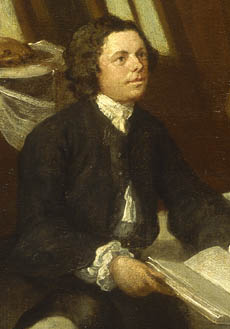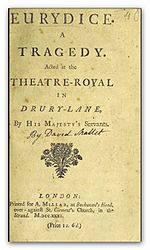David Mallet (writer) facts for kids

David Mallet (also known as Malloch) was a Scottish poet and writer who lived from about 1705 to 1765. He was known for writing plays and poems.
He studied at the University of Edinburgh. In 1723, he moved to London to work as a private teacher. There, he became friends with famous writers like Alexander Pope and James Thomson. He also knew important people like Henry St John, Viscount Bolingbroke.
One of his most famous works is William and Margaret, a poem based on an old folk song. In 1740, he worked with James Thomson on a special play called Alfred. This play included the very famous song "Rule, Britannia!". While his other plays and poems were popular back then, most people don't remember them today. However, Mallet did help publish the writings of his friend Bolingbroke in 1754.
Contents
David Mallet's Early Life and Education
David Mallet was likely born around 1705. His family lived in Perthshire, Scotland. They were tenant farmers, meaning they rented land. His family was Roman Catholic and part of the Clan MacGregor. They faced difficulties during the Jacobite Rebellion of 1715, a time when some Scots tried to bring back the old royal family.
Mallet probably went to school in Crieff. In 1717, he worked as a janitor at Edinburgh High School. By 1720, he became a live-in tutor for the sons of Mr. Home of Dreghorn. He kept this job until 1723. During this time, he also studied at the University of Edinburgh. He became good friends with another student, James Thomson, who would later become a famous poet and his writing partner.
Moving to London and Becoming a Tutor
In July 1723, Mallet got a job as a tutor for the sons of the Duke of Montrose. He left the university without finishing his degree. In August, he moved to London and then to the Duke's home near Winchester. He lived with the Montrose family until 1731, spending most of his time in London and at their country estate.
In 1726, he received an honorary Master of Arts (M.A.) degree from the University of Aberdeen. This was given for an English poem he wrote. In 1727, he traveled around Europe with his students. Near the end of 1731, he left the Montrose family. He then went to Gosfield in Essex to teach the stepson of John Knight. Alexander Pope, a very famous poet, had recommended him for this job.
Mallet's Time at Oxford
On November 2, 1733, Mallet and his student enrolled at St. Mary Hall, Oxford. He lived there regularly until September 1734. In March 1735, he received another M.A. degree from the University of Edinburgh. Soon after, he also earned his Bachelor of Arts (B.A.) and M.A. degrees from the University of Oxford. He traveled abroad again in 1735.
Mallet became popular with political groups who opposed the government. In 1742, he was appointed as an assistant to the Prince of Wales. In 1745, he traveled to Holland.
Later Life and Death
In 1763, Mallet received a special job from Lord Bute, a powerful politician. This job was called "inspector of exchequer-book in the outports of London." It was a "sinecure," meaning he got paid for it but didn't have to do much work. He kept this job until he died. In 1764, he joined his wife, Lucy, in Paris. However, he became ill and had to return to London. He passed away on April 21, 1765, and was buried in St. George's cemetery in London.
David Mallet's Literary Works
Mallet started publishing his writings early. In 1720, he published a poem called Pastoral in a collection of writings. During his college years, he wrote several short pieces. One was called The Transfiguration, which was inspired by the poet John Milton.
His famous ballad, William and Margaret, was first published without his name. Then, in 1724, it appeared in two other collections of writings. He wrote more poems, many for his teacher John Ker. In 1725, he wrote verses about a friend named Mira. He also wrote a dedication and some verses for the second edition of his friend Thomson's poem Winter. Mallet himself had written a poem about winter in 1725, which Thomson praised. After returning from Europe, he prepared his poem The Excursion for publication.
On February 22, 1731, Mallet's play Eurydice was performed at a famous theater in London. It was performed about thirteen times and brought back to the stage in 1759. Mallet also showed his respect for the poet Alexander Pope in his poem Verbal Criticism (1733). In this poem, he made fun of another writer, Lewis Theobald.
Famous Plays and Collaborations
Mallet gained more fame with his play Mustapha, which was performed in February 1739. His friend Thomson wrote the introduction for this play. The play was dedicated to Frederick, Prince of Wales. Like Thomson's play Edward and Eleonora, Mustapha subtly criticized the king and his chief minister, Sir Robert Walpole. The play was very popular and ran for fourteen nights.
In 1740, Mallet published a short book about the life of Francis Bacon. Soon after, the Prince of Wales asked Mallet and Thomson to write a special play called Alfred. This play was to celebrate the birthday of Princess Augusta and the day King George I came to the throne. It was performed outdoors in the gardens of Cliefden on August 1, 1740.
Working with Important Figures
Sarah Churchill, Duchess of Marlborough, a very wealthy and powerful woman, left money in her will for Mallet and another poet, Richard Glover. She wanted them to write a book about her husband's life. Glover refused, so Mallet took on the job. He only did some research for it. In May 1747, he published his poem Amyntor and Theodora, or the Hermit.
Mallet and Thomson had support from the Prince of Wales for a while. However, they lost this support when their friend George Lyttelton fell out of favor. Mallet then found a new supporter in Henry St John, 1st Viscount Bolingbroke. Mallet helped prepare a new edition of Bolingbroke's book, Patriot King, which was published in 1749. In this book, Mallet criticized Alexander Pope for secretly publishing an earlier version of the work. This led to a short argument between Mallet and Pope's friends. Mallet then edited all of Bolingbroke's works, which were published in five volumes in 1754.
Later Plays and Writings
In 1751, three years after Thomson died, Mallet published a new version of the Alfred play from 1740. He made many changes, adding new scenes and songs. It was performed in London in February 1751, with the famous actor David Garrick in the main role.
Another play, Britannia, followed in 1755. This play encouraged patriotic feelings as a war with France was about to begin. It was performed in May, with David Garrick acting as a drunken sailor in the introduction.
On January 19, 1763, Mallet's play Elvira was performed. David Garrick played the part of Don Pedro, which was the last new character he ever played on stage. Mallet also wrote other works, like the ballad Edwin and Emma (1760). He also wrote a strong criticism against Admiral Byng in 1757.
Images for kids
 | Madam C. J. Walker |
 | Janet Emerson Bashen |
 | Annie Turnbo Malone |
 | Maggie L. Walker |




